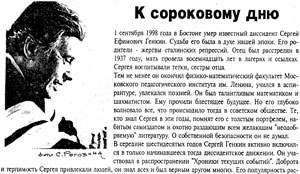On September 1, 1998, well-known dissident Sergei Yefimovich Genkin died in Boston. His destiny was in the spirit of our time. His parents were victims of Stalin’s repressions. His father was executed by shooting in 1937, his mother spent 18 years in camps and exile. Sergei was raised by his aunts, his father’s sisters.
Nevertheless, he graduated from the Mathematics and Physics Department of the Moscow Lenin Pedagogical Institute, studied at the graduate school, and enjoyed poetry. He was a talented mathematician and chess player. He was deemed a man with a big future. But he was deeply involved in everything that was going on then in the Soviet Union. Those who knew Sergei in those years remember him always with a thick suitcase stuffed with Samizdat books, willingly giving away to all who were interested copies of “unapproved” literature. He never thought of his own safety.
In the mid-sixties Sergei Genkin actively participated in the dissident movement, which was then just emerging. He took part in the distribution of the “Chronicle of Current Events.” Sergei’s kindness and tolerance attracted people; he knew everybody and was a good friend to many. His popularity as a source of Samizdat helped him draw more and more new members to the movement.
The KGB was on Sergei’s trail. His apartment was ravaged numerous times by destructive searches; he was repeatedly summoned for interrogations and “discussions.” He comported himself with dignity and fearlessness.
For about four months in 1984, Sergei and his wife Irina Kristi were under the relentless surveillance of all branches of Soviet law enforcement–KGB, militia and prosecutor’s office–and were practically under house arrest. The rank and file of these agencies kept round-the-clock watch at the door of their apartment. Sergei was accompanied by a KGB agent from his doorstep to work–all because Irina Kristi had penetrated the severe isolation of the Sakharovs created by the KGB in Gorky. She managed to talk to them and tell the world about their real situation.
Soon after his house arrest Sergei fell gravely ill. The diagnosis was not made right away; it came several years after he and his family immigrated to America. The diagnosis was terrifying: multiple sclerosis. The disease tormented Sergei, but his personality remained the same as in his young years. He never complained. He was always surrounded by people. He was curious about everything and everybody–especially about Russia. He never lost hope for a happy outcome of the events back home.
Sergei Genkin was a shining person. This is how we will remember him. We offer our sincere condolences to his widow Irina Kristi, and his sons, Grigory Genkin, Pyotr Sergiyevsky and Dmitry Slavutsky.
|
ON THE 40-TH DAY.
|
|
|
